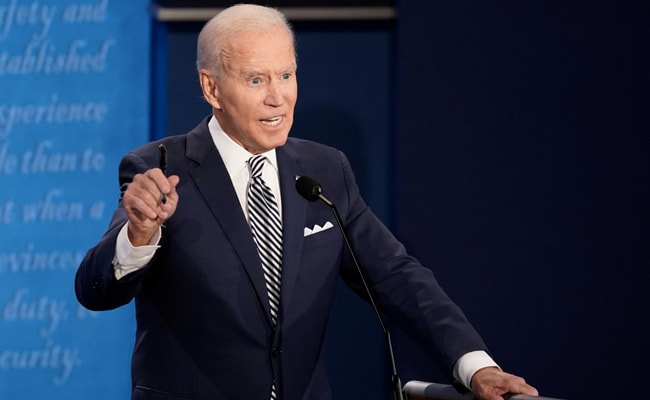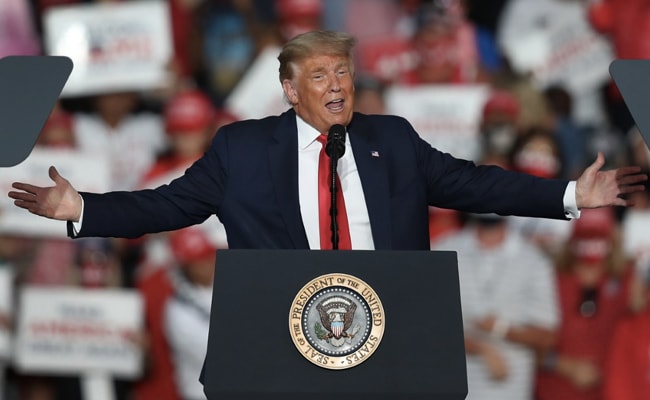
In three weeks Americans will have their last opportunity to vote for the next president of the United States. Already, more than 11 million Americans have cast their votes in the biggest early voting in the history of the US elections. If Joe Biden fails to hold onto his opinion poll lead, it will be the first time since polling began in 1936 that a candidate has blown such a big lead.
The tragedy for Joe Biden and the Democrats is that it just could happen. Which is why President Donald Trump, with whatever cocktail of drugs he has swallowed, is out campaigning less than two weeks after contracting Covid. He knows that popular votes don't win presidencies, electoral votes do. When it comes to that he is still in with a chance, perhaps not as good as the one he had around the same time in 2016, but a chance nonetheless.

Democratic presidential candidate Joe Biden
The simple point is that if Trump holds all the traditional Red (Republican) states and wins Florida along with one of the three states he snatched from Hillary Clinton last time, he will be back in the White House.
Until yesterday the math was in Trump's favour; he was doing better in the battleground states this year than in 2016, and they are the only ones that matter. According to RealClearPolitics, in the 13 battleground states on Monday morning, Trump was doing 0.2% better than in 2016.

Source: RealClearPolitics
In 2016 Trump managed to win 11 of the thirteen states, overturning Clinton's leads in 9 of them.
Trump has the same 20 days in which to turn it around.
Of course, the polls could be just plain wrong, because people lie. There is a belief that many voters don't want to tell pollsters that they are voting for Trump; just as they don't want their neighbour to know that either.
Two findings in polls that support this are that Gallup reported that 56% voters believe Trump will win and only 40% think Biden will.
This is very strange, given Biden currently leading in all the polls by more than 10 points:
Biden 53%
Trump 42%
If you combine this with the very common polling answer that "57% (of voters) believe there are a number of secret voters who support Trump but won't tell anyone", you can see why, if you are in Biden's camp, you will be worried.
The Economist put the issue another way when it said it is a phenomenon researchers call "differential partisan non-response" - when a candidate you support is doing badly, you are less likely to answer the pollsters call.
But there is loads of good news for Biden. First, his lead in polls has grown throughout October.

Source: RealClearPolitics
Secondly, on Monday, the penny he was waiting for may have dropped; for the first time, swing states like Pennsylvania and Michigan showed much larger leads than Clinton ever had and in Pennsylvania, the traditional Republican pollster, The Trafalgar Group, found Biden ahead. In Wisconsin, the third state that defected to the Republicans in 2016, the New York Times put Biden ahead by 10 points.
There was more good news on Tuesday morning when Morning Consult put Biden ahead in North Carolina and Florida, both states Trump won in 2016. The only bad news was he was trailing in Ohio which, along with Florida, are states that have the best records of selecting the right presidential winner since WW2; both have been wrong only twice.
Turnout was one factor that did Clinton in. Too many Democratic voters stayed home, especially blacks in Wisconsin and Michigan, and urban voters in Pennsylvania. This year, in Senate Majority leaders words "the democrats seem really charged up".

US President Donald Trump
Early voting, which began in some states last month, supports this. Voters are out in huge numbers, especially Democrats:
So far 11.5 million have voted - that's 10 times the 1.4 million that voted in the week ending October 16, 2016.
In Florida, the total votes cast is 1.8 million, more than the total national last time at this stage.
In three states, Virginia, Michigan and Wisconsin, the turnout so far is more than 20% of the total votes cast in 2016.
More than 75 million voters have asked for postal ballots - that's twice as high as 2016. Of these, Democrats are 44%.
Of the votes cast so far in states that give party affiliation, Democrats are first off the block:

Source: The United States Elections Project
Finally, the odds for a Biden win are 66:34. Even Wall Street seems to accept that he may win, with Goldman Sachs saying that the market should not worry about a Biden win. If the recent big surge in tech stocks is anything to go by, they aren't worried. The only people who are worried in fact, are the Democrats; once bitten, they don't want to be "Biden" by Trump twice.
(Ishwari Bajpai is Senior Advisor at NDTV)
Disclaimer: The opinions expressed within this article are the personal opinions of the author. The facts and opinions appearing in the article do not reflect the views of NDTV and NDTV does not assume any responsibility or liability for the same.
Track Latest News Live on NDTV.com and get news updates from India and around the world

